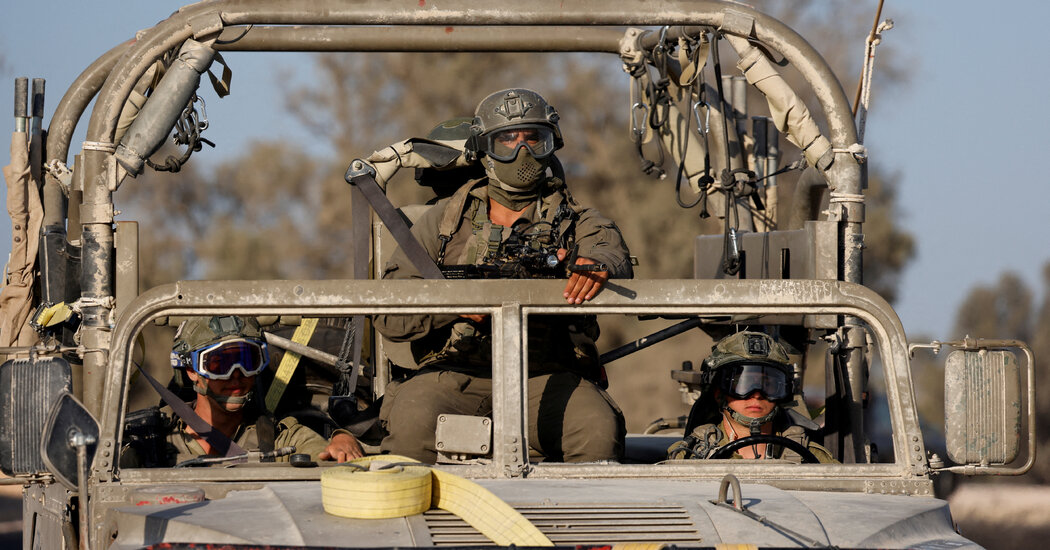Israel’s defense minister met with the C.I.A. director on Monday morning in Washington and was expected to sit down with the secretary of state, as the United States works to head off a new Israeli miliary push in Lebanon.
The defense minister, Yoav Gallant, planned to meet with Secretary of State Antony J. Blinken at 1 p.m. after seeing the C.I.A. director, William J. Burns, earlier on Monday, officials said.
The visit comes at a crucial time for Israel and the war in Gaza. The fate of a cease-fire agreement that would release the hostages is unclear, worries about intensified fighting between Hezbollah and Israel are increasing, and Prime Minister Benjamin Netanyahu said that the intensive phase of Israel’s war against Hamas in the Gaza Strip was “about to end.”
Monday’s meetings will focus on all three issues, with American officials seeking clarity on the Israeli government’s intentions with a possible cease-fire agreement and whether Israeli leaders are considering a new offensive against Hezbollah fighters in southern Lebanon, military action that Washington worries could drag the United States into a wider regional war.
Mr. Gallant is also scheduled to meet with Defense Secretary Lloyd J. Austin III on Tuesday and with President Biden’s national security adviser, Jake Sullivan, on Wednesday.
Early in the war, Mr. Gallant publicly outlined a three-phase battle plan for Gaza that included intense airstrikes against Hamas targets and infrastructure; a period of ground operations aimed at “eliminating pockets of resistance”; and a third phase that would create “a new security reality for the citizens of Israel.” He said over the weekend that his meetings in Washington would feature discussion of “the transition to ‘Phase C’ in Gaza.”
On Sunday, Mr. Netanyahu left ambiguity around how his government expects the war to end. In an interview with an Israeli television station, he said at one point that he was ready to agree to a temporary truce and the release of some of hostages in Gaza, then subsequently resume the war. That appeared to contradict an Israeli proposal — endorsed by Mr. Biden and the United Nations Security Council — for a phased deal that would release all the Israeli hostages there and usher in a permanent cease-fire.
Mr. Netanyahu also continued to rule out a proposal, pushed by the Biden administration, to hand over Gaza to the Palestinian Authority, a Western-backed administration that lost control of the enclave in 2007 and exercises limited rule in parts of the occupied West Bank.
One question is how a temporary truce or permanent cease-fire in Gaza might affect tensions between Israel and Hezbollah, a powerful militia and Lebanese political faction backed by Iran.
The two conflicts are intertwined: Hezbollah began cross-border strikes into northern Israel in support of Hamas after Israel launched its offensive in Gaza in response to the Hamas-led Oct. 7 attack on Israel. Analysts have said that a deal to end the Israel-Hezbollah conflict is unlikely as long as the war in Gaza persists.
Escalating fire across the Israel-Lebanon border in recent weeks has been stoking fears that the fighting could grow into all-out war. Over the weekend, the Israeli military said it had killed a militant in an airstrike deep inside Lebanese territory. Lebanese state media reported that the Israeli strike had hit a village about 25 miles from the border.
On Sunday, Mr. Gallant met in Washington with Amos Hochstein, a Biden adviser who has overseen previous talks between Israel and Lebanon. Mr. Hochstein had met with Mr. Netanyahu in Jerusalem less than a week earlier, as the Israeli military warned that Hezbollah’s cross-border strikes against Israel risked a wider confrontation.
Gen. Charles Q. Brown Jr., the chairman of the U.S. Joint Chiefs of Staff, told reporters on Sunday that an Israeli military offensive in Lebanon would risk an Iranian response, according to The Associated Press.
#Latest #Gaza #News #Phase #Israels #War #Hamas #Shift #Focus #Hezbollah,
#Latest #Gaza #News #Phase #Israels #War #Hamas #Shift #Focus #Hezbollah
